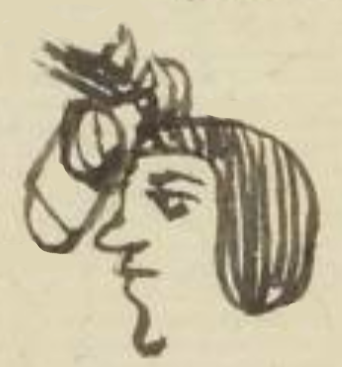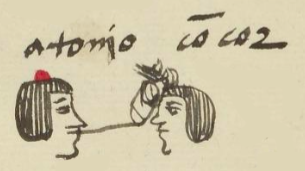Cocol (MH896r)
This black-line drawing of the simplex glyph for the personal name Cocol (“A Quarrel” or perhaps "Entrusted to Another Person," attested here as a man’s name) shows a profile view of a human hand grasping the hair of another man, which could be represent a quarrel or dispute. Alternatively, the hand may be taking the person into custody, conveying the other meaning of cocol. (See the dictionary entries.) The gloss gives a final “r” on the end of the name in place of “l,” but the previous name in the list also has an “r” where an “l” should be. The substitution of “r” for “l”--and vice versa–can be found elsewhere in the Matrícula de Huexotzinco.
Stephanie Wood
This name has various visual representations in this digital collection, and it requires further study before settling upon a satisfactory translation. See the dictionary entries. The visual variation may mean that some glyphs represent one translation of cocol- and some represent a different one. Some could be literal, and some may be phonetic indicators. To pull or cut someone's hair in Nahua culture was a grave insult and cause of intense emotion. Sonya Lipsett-Rivera writes about the ritual humiliation of hair pulling in Religion in New Spain, eds. Susan Schroeder and Stafford Poole (2007), 79.
Stephanie Wood
atonio cōcor
Antonio Cocol
Stephanie Wood
1560
Jeff Haskett-Wood
enojo, ira, pelea, emoción, nombres de hombres

cocol(li), a quarrel, pain, something twisted, or the divine force of fire, https://nahuatl.wired-humanities.org/content/cocolli
cocol, to be entrusted to another person, https://nahuatl.wired-humanities.org/content/cocol
cocolia, to detest or hate someone, https://nahuatl.wired-humanities.org/content/cocolia
Riña, o Enojo
Stephanie Wood
Matrícula de Huexotzinco, folio 896r, World Digital Library, https://www.loc.gov/resource/gdcwdl.wdl_15282/?sp=864&st=image.
This manuscript is hosted by the Library of Congress and the World Digital Library; used here with the Creative Commons, “Attribution-NonCommercial-ShareAlike 3.0 License” (CC-BY-NC-SAq 3.0).






